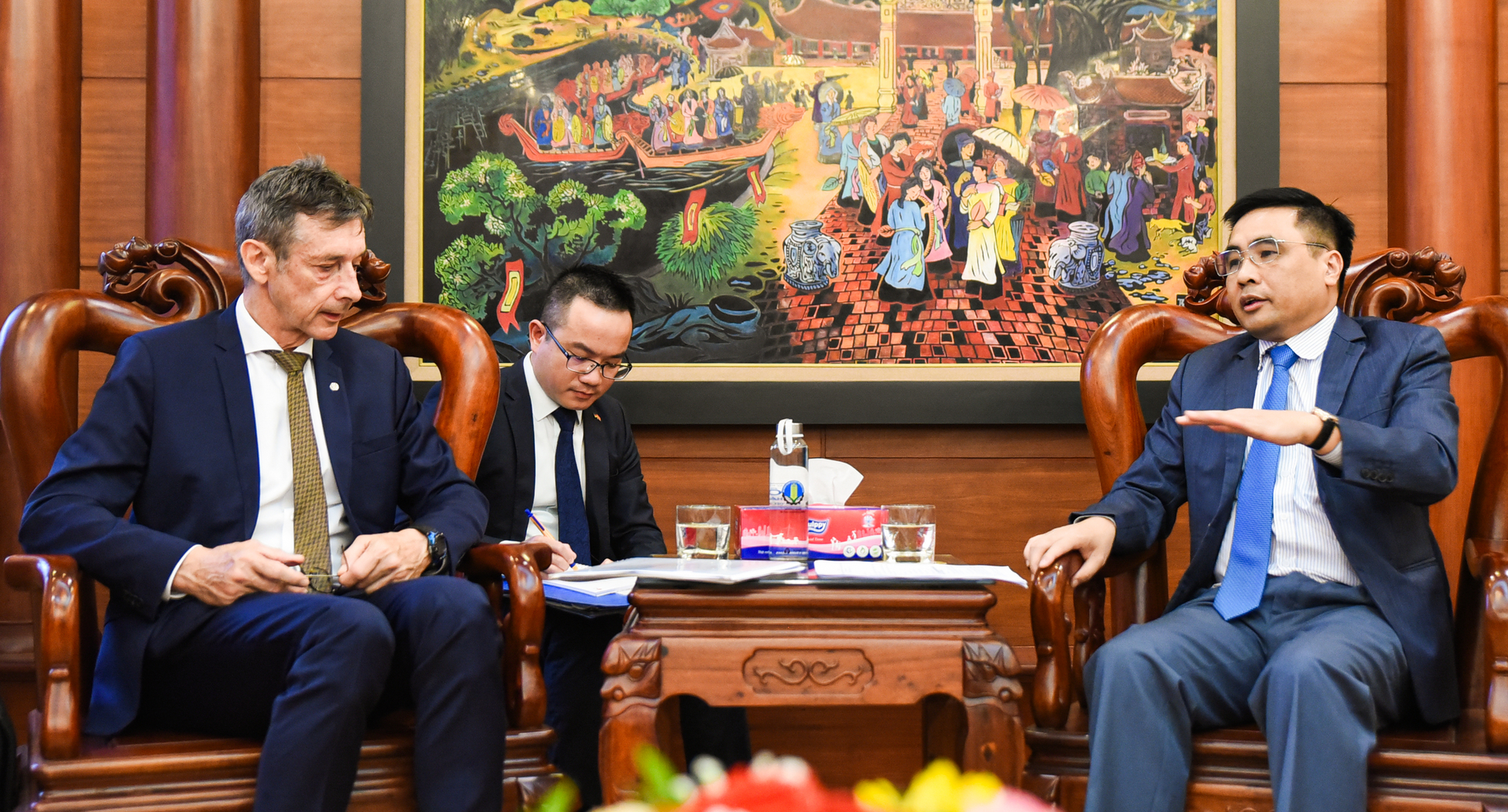June 14, 2025 | 20:57 GMT +7
June 14, 2025 | 20:57 GMT +7
Hotline: 0913.378.918
June 14, 2025 | 20:57 GMT +7
Hotline: 0913.378.918
On July 24, MARD Deputy Minister Nguyen Quoc Tri meets and discusses with Mr. Christoph Hoffmann, Substitute Deputy of the Committee on Economic Cooperation and Development of the German Bundestag.
The leaders discuss topics related to cooperation in forestry, timber management, and biodiversity, which aims toward green growth and sustainability in response to climate change.

MARD Deputy Minister Nguyen Quoc Tri meets and discusses with Mr. Christoph Hoffmann, Substitute Deputy of the Committee on Economic Cooperation and Development of the German National Assembly. Photo: Pham Huy.
Deputy Minister Nguyen Quoc Tri appreciates the support from the Committee on Economic Cooperation and Development of the German Bundestag, especially in agricultural development over the past years. Specifically, since 1995, the KfW Development Bank has funded nearly 200 million EUR for many projects in the agricultural sector.
The forest cover rate in Vietnam was 28% in 1995 but has increased to approximately 42% in 2023. The projects implemented by KfW have helped to plant and restore approximately 320,000 hectares of forest, sustaining and benefiting hundreds of thousands of households from more than 250 communes in the mountainous areas of Vietnam.
For non-refundable projects (mainly through the German Agency for International Cooperation - GIZ), the total grant is approximately 120 million EUR. Currently, there are 15 projects underway or in the process of preparation and approval.
Commanding Vietnam’s cooperation, Mr. Christoph Hoffmann states that Vietnam is gradually succeeding in forestry and sustainability, contributing to global biodiversity conservation. He is also thrilled to know that German development projects in Vietnam have benefited communities living near and dependent on forests.
Mr. Christoph Hoffmann shares that this is his first time visiting Vietnam. He is very impressed with the acacia forests in Vietnam, which not only increase forest coverage but also help farmers living near forests have stable incomes and jobs. Besides, he has visited traditional wood handicraft villages and met with craftsmen there.
Understanding the forestry profession and the farmers’ lives, the Substitute Chairman of the Committee on Economic Cooperation and Development of the German Bundestag wishes to increase further wood production and forest area in Vietnam, which helps to reduce emissions, increase forest cover and protect the ecosystem.
Deputy Minister Nguyen Quoc Tri applauds the companionship of the German Bundestag in the field of agriculture. The Deputy Minister informs that Vietnam's current acacia growing area is about 2.3 - 2.5 million hectares, of which 70 - 80% provide raw materials for processing wood products. The acacia industry provides jobs for nearly 2 million households in timber production and engagement in afforestation.
In order to increase productivity on planted forests, the Deputy Minister hopes to receive Germany’s support on topics such as the forest certification process; selective breeding methods; effective farming systems; carbon sinks; and new technologies to support enterprises in the agricultural sector.

Vietnam aims to maintain a forest cover rate of 42%.
In addition, the Deputy Minister states that Vietnam aims to maintain the forest cover rate at 42% while increasing the export value of wood and wood products. To realize these goals, Vietnam’s forestry sector is committed to increasing the productivity of planted forests from 16m3 per hectare to 25m3 per hectare by 2030, developing seed quality and practical farming, and transforming digital technology.
These processes will ensure people’s livelihood via agroforestry models, encouraging people to join hands in forest protection. At the same time, the processes increase the position of Vietnam’s forestry industry in the international market and expand the traditional wood handicraft market.
Also, Mr. Christoph Hoffmann mentions the European Union Deforestation Regulation (EUDR) at the meeting. Specifically, he is interested in the forestry industry’s approach to strict supply chain requirements as well as afforestation and wood processing.
Deputy Minister Nguyen Quoc Tri commands the European Union’s responsibility for preventing deforestation and illegal logging. In order to comply with EUDR shortly, MARD leaders are committed to comprehensive national agricultural planning, and at the same time, hope to receive the support of Germany on traceability technology.
Representatives of the two countries agreed that technological solutions will be significant in sustainable agricultural development. Both parties especially appreciate bilateral cooperation in responding to climate change. For the leaders, protecting forests and biodiversity is an opportunity for both sides to cooperate and collaborate in protecting the ecosystem for future generations.
Translated by Quynh Chi

(VAN) The working delegation from the Ministry of Agriculture and Environment conducted an important trip to the Netherlands to strengthen strategic partnerships and sustainable development in the agricultural sector.

(VAN) The letter ‘A Plea from the Ocean’ not only evokes emotion but also awakens the human conscience to the responsibility of protecting life on Earth.

(VAN) The Department of Agriculture in South Africa has announced the country’s first mass vaccination of poultry to prevent local birds from contracting avian influenza.

(VAN) Establishment of the Mekong Delta Regional Agricultural Linkage Center, aiming for a closed value chain, deep processing, trading platforms, and international market connectivity.

(VAN) Gia Lai province has recently recorded 460 rare species of animals and plants, contributing to forest conservation and biodiversity planning in the region.

(VAN) Ms. Caroline Beresford, New Zealand Ambassador to Vietnam, expressed confidence that agricultural cooperation between Vietnam and New Zealand will develop sustainably, be climate-resilient, and promote gender equality.

(VAN) Vietnam reaffirms its commitment to international cooperation in fostering sustainable and responsible fisheries while ensuring resilient livelihoods for small-scale fishing communities.